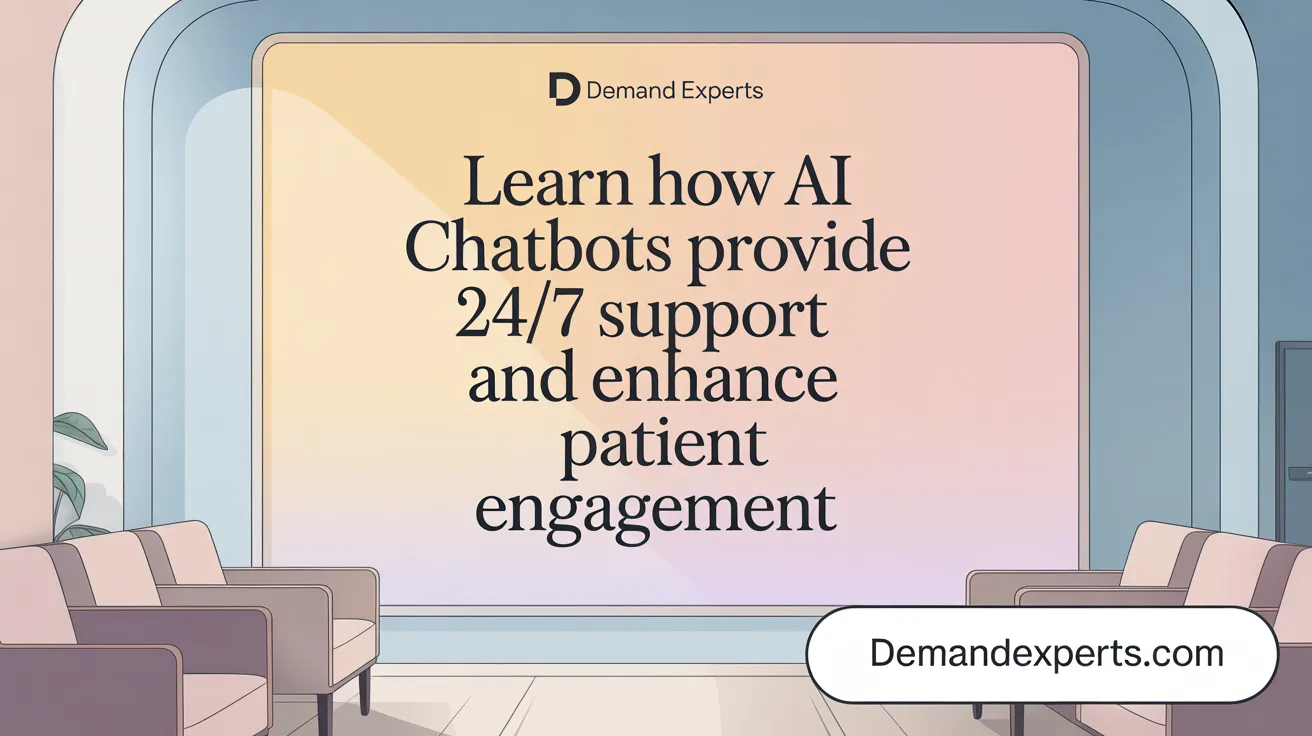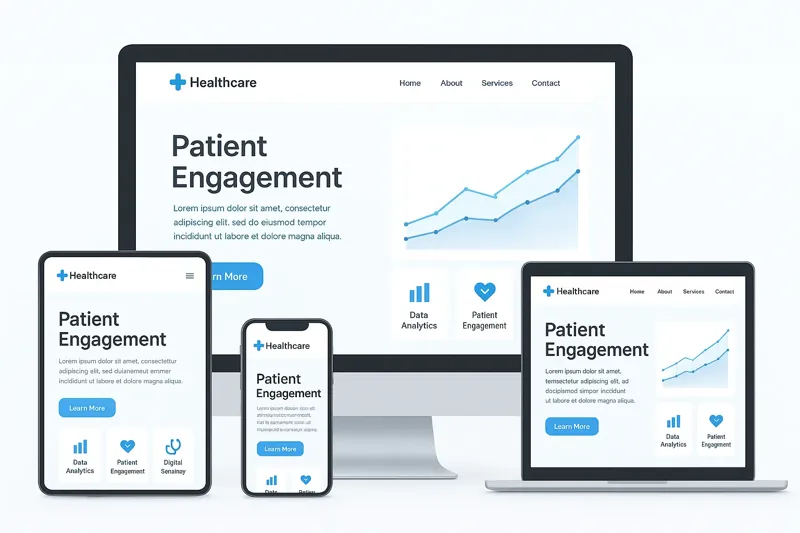Transforming Patient Support Through AI Chat Technology
Healthcare organizations are increasingly adopting AI chatbot solutions to provide real-time patient support. These AI-powered systems leverage advanced technologies to facilitate 24/7 communication, enhance patient engagement, and optimize healthcare operations. This article explores the technology behind healthcare AI chatbots, their benefits, challenges, and best practices for successful implementation, with special emphasis on tailored applications for specific patient groups like cancer patients.
Understanding the Technology Behind Healthcare AI Chatbots

Healthcare AI chatbots operate on a blend of sophisticated technologies that enable them to communicate effectively with patients and support various healthcare functions.
At the core is Natural Language Processing (NLP), which allows these systems to interpret and generate human-like language. NLP helps translate complex medical terminology into clear, understandable responses that patients can easily comprehend. This technology also enables chatbots to handle a variety of health-related queries, from symptom checking to medication instructions.
Complementing NLP is machine learning and deep learning. These techniques analyze large amounts of past interaction data to improve responses over time. They personalize conversations based on individual patient histories and preferences, making interactions more relevant and helpful.
Speech recognition technology plays a vital role in voice-based interactions, allowing patients to communicate with chatbots using spoken language. This enhances accessibility, especially for users who prefer talking over typing.
Sentiment analysis assesses the emotional tone of patient messages. It helps chatbots recognize signs of distress or anxiety, ensuring that responses are empathetic and, when necessary, prompt escalation to human healthcare providers.
Integration with healthcare systems is essential for providing comprehensive care. These chatbots can connect with electronic health records (EHR), appointment scheduling tools, telemedicine platforms, and pharmacy systems. Such integration streamlines administrative tasks and facilitates seamless patient care.
Recent advancements include large language models like GPT-4. These models significantly boost a chatbot’s ability to understand context, manage complex dialogues, and generate high-quality responses. They support routine healthcare checks, mental health support, and educational content.
Altogether, these technological components enable healthcare AI chatbots to serve as effective virtual assistants, improving patient access, engagement, and health outcomes. Despite rapid progress, ongoing considerations around safety, privacy, and regulation are essential to ensure responsible deployment.
Core Functionalities of AI Chatbots in Healthcare

What are the main ways AI chatbots support healthcare delivery?
AI chatbots serve multiple roles in modern healthcare, providing crucial support for both patients and providers. Among their core functions are symptom assessment, medication reminders, and appointment scheduling.
Symptom assessment involves collecting patient-reported information about their health status. These bots analyze symptoms, often using natural language processing, to offer initial guidance or flag urgent cases needing immediate medical attention.
Medication reminders are another vital feature. They help patients adhere to their prescribed regimens by sending timely prompts, reducing the risk of missed doses and improving treatment outcomes.
Appointment scheduling is streamlined through chatbots that allow patients to book, reschedule, or cancel visits easily. Integrated with healthcare systems, this feature reduces administrative burdens and enhances accessibility.
Beyond these, chatbots also offer mental health support by providing a safe space for users to talk about their feelings. They can detect signs of distress and guide users toward professional help when necessary.
Chronic disease management is supported by ongoing monitoring and education, helping patients control their conditions more effectively. Additionally, chatbots facilitate health education, providing patients with accurate, easy-to-understand information about symptoms, treatments, and wellness tips.
Finally, integration with telehealth services enables seamless virtual consultations. Chatbots can pre-screen symptoms, gather relevant patient data, and connect users to healthcare professionals when needed.
| Functionality | Description | Benefits |
|---|---|---|
| Symptom assessment | Collects health info, offers guidance | Accelerates diagnosis, flags emergencies |
| Medication reminders | Sends scheduling alerts | Improves adherence, treatment effectiveness |
| Appointment scheduling | Manages bookings and rescheduling | Reduces administrative load, quick access |
| Mental health support | Provides conversational support for emotional well-being | Enhances comfort, early detection of distress |
| Chronic disease management | Ongoing monitoring and education | Better condition control, reduce hospital visits |
| Health education | Shares accurate health info | Empowers patients, improves health literacy |
| Telehealth integration | Connects to virtual care services | Expands access, saves time and resources |
AI chatbots are transforming healthcare through these interconnected functionalities. They make care more accessible, personalized, and efficient, supporting a broad range of health needs.
Benefits and Advantages of AI Chatbots for Real-Time Patient Support

AI chatbots are transforming healthcare by providing round-the-clock assistance to patients. Their 24/7 availability ensures that individuals can access health information, schedule appointments, or seek support at any time, which is particularly beneficial during emergencies or outside normal clinic hours.
One of the key benefits is improved patient engagement. Chatbots create a more interactive and personalized experience by answering questions, guiding symptom assessments, and offering health education tailored to individual needs. This increases patient satisfaction and encourages proactive health management.
Operational efficiency is greatly enhanced when routine tasks are automated through chatbots. Tasks like appointment booking, medication reminders, and preliminary triage are handled swiftly, reducing waiting times and alleviating workload for healthcare staff. As a result, healthcare providers can focus more on complex cases requiring human expertise.
Cost reduction is another significant advantage. By streamlining administrative processes and decreasing unnecessary in-person visits, healthcare systems can save billions of dollars annually. Additionally, chatbots help in early detection of health issues by continuously monitoring symptoms and behavioral data, leading to timely interventions.
AI chatbots also promote health equity and inclusivity. Through multilingual support and virtual access, they bridge language barriers and reach underserved populations, including people with disabilities or those in remote areas. This inclusivity supports more equitable healthcare delivery.
Furthermore, chatbots assist in early detection of high-risk conditions by analyzing symptoms and health patterns to flag potential concerns. They also play a supportive role in clinical decision-making by providing healthcare providers with valuable insights based on patient interactions.
In summary, AI-powered chatbots enhance healthcare by offering immediate, accessible, and personalized support. Their ability to improve operational workflows, promote equitable access, and support early diagnosis makes them essential tools in advancing modern healthcare services.
Enhancing Patient Care and Operational Efficiency with AI Chatbots

AI chatbots are transforming healthcare by delivering around-the-clock, personalized support to patients. They enable users to access health information, perform symptom checks, manage medications, and obtain mental health support anytime, which elevates patient engagement and adherence to treatment plans.
These digital helpers also streamline many operational tasks within healthcare organizations. Automated appointment scheduling and reminders reduce administrative workload, while triaging patients helps prioritize urgent cases and allocate resources effectively. Through data collection and analysis, chatbots provide valuable insights that enhance care delivery.
Integration with electronic health records (EHR), telemedicine platforms, and other healthcare systems allows chatbots to deliver more accurate diagnoses and faster service. They help reduce wait times, prevent unnecessary visits, and facilitate seamless communication between patients and providers.
The financial benefits are substantial. Studies project that global healthcare systems could save up to USD 3.6 billion by 2025 by adopting AI chatbots, thanks to reduced labor costs and increased efficiency. Further, chatbots support remote monitoring and management of chronic conditions, especially useful in underserved regions where access to specialist care is limited.
Healthcare organizations employing chatbots report higher patient satisfaction and better long-term health management outcomes. Overall, AI chatbots help create more efficient, responsive, and accessible healthcare systems, leading to improved patient experiences and better resource utilization.
Challenges and Limitations in Deploying AI Chat Systems in Healthcare
What challenges and limitations do healthcare providers face when deploying AI chat systems?
Implementing AI chatbots in healthcare introduces several hurdles. One major technical challenge involves natural language processing (NLP), which sometimes struggles to fully grasp patient questions, especially when medical language, slang, or regional dialects are involved. This can lead to misunderstandings or inaccurate advice.
Moreover, chatbots often lack the capacity for genuine empathy, which is vital in sensitive health discussions. Patients may feel less comfortable sharing their feelings with machines, potentially affecting trust and engagement.
Ethical and legal issues loom large. Concerns about data privacy, confidentiality, and legal accountability for errors raised by AI systems demand strict compliance with regulations like HIPAA. Ensuring that patient data remains secure and private is a constant priority.
Algorithm bias is another significant problem. When datasets fail to represent diverse populations, chatbot responses can inadvertently reinforce health disparities. This impacts the reliability and fairness of AI assistance across different demographic groups.
The risk of misinformation is also notable. Without continuous human oversight, chatbots could provide outdated or harmful advice, which might jeopardize patient safety.
Finally, reliance on AI tools requires the maintenance of human oversight. Healthcare professionals need to monitor and validate chatbot responses to prevent errors, ensuring safe and effective care. Addressing these challenges remains essential for the successful integration of AI chatbots into routine healthcare practice.
Best Practices for Implementing AI Chatbots in Healthcare Settings
What are the best practices and operational considerations for implementing AI chatbots in healthcare settings?
Successfully adopting AI chatbots in healthcare requires careful planning and adherence to several important practices. First, maintaining rigorous privacy and security protocols is essential. This includes utilizing end-to-end encryption, anonymization techniques such as data masking, and ensuring compliance with regulations like HIPAA and GDPR to protect patient data.
Thorough needs assessments and clear goal definitions help determine what functions the chatbot should perform. Seamless integration with existing healthcare systems, such as electronic health records, appointment scheduling platforms, and telehealth services, is vital for operational efficiency.
Involving healthcare professionals during development ensures the chatbot provides accurate, relevant, and safe information. Designing interfaces that are simple, intuitive, and accessible—supporting multiple languages and regional dialects—enhances user engagement and inclusivity.
Another critical aspect is establishing transparent pathways for escalation. When cases become complex or sensitive, users should be able to easily connect with human clinicians.
Ongoing system performance monitoring, regular testing with real users, and updates based on user feedback help uphold quality and compliance over time. Supporting customization options, selecting scalable platforms, and encouraging collaboration across disciplines are operational considerations that contribute to a responsible and effective deployment.
By adhering to these best practices, healthcare providers can maximize the benefits of AI chatbots—improving patient access, engagement, and safety while maintaining regulatory compliance and trust.
Tailoring AI Chatbots for Specific Patient Groups: Focus on Cancer Care
AI chatbots can be customized to better serve specific patient populations, such as cancer patients, by integrating specialized guidelines and tools. For instance, these chatbots utilize detailed cancer treatment protocols and trusted medical sources to guide conversations and provide accurate information.
A crucial feature includes symptom monitoring, where patients can report changes or side effects, allowing the chatbot to suggest appropriate actions or alert healthcare providers if necessary. Medication and treatment reminders are also embedded, supporting adherence and reducing the risk of missed doses.
Moreover, emotional and psychological support is vital for cancer patients. Chatbots can offer empathetic conversations, coping strategies, and mental health resources, helping to reduce feelings of isolation and anxiety.
To cater to diverse needs, many chatbots offer multilingual support and customizable interactions, ensuring accessibility across different regions and languages. This broadens the reach to underserved communities and improves inclusivity.
Effective communication with healthcare providers is facilitated through these tools, enabling patients to share updates instantly, schedule appointments, or seek urgent advice. This seamless data flow enhances personalized care and quickens response times.
Additionally, AI chatbots play an essential role in reducing misinformation by delivering validated, up-to-date medical content. They help patients navigate complex health information, distinguishing credible guidance from inaccurate sources.
Overall, tailored chatbots for cancer care improve adherence to treatment plans, foster better patient-provider communication, and support emotional well-being. By integrating disease-specific protocols, monitoring features, and personalized communication, these digital assistants enhance the quality of care and patient engagement, ultimately aiming for better health outcomes.
Addressing Compliance, Privacy, and Ethical Challenges in Healthcare AI Chatbots

What compliance, privacy, and ethical considerations should be addressed when deploying AI chat systems in healthcare?
Deploying AI chatbots in healthcare requires careful attention to various compliance, privacy, and ethical issues. A primary concern is adhering to legal standards such as the Health Insurance Portability and Accountability Act (HIPAA) in the United States, which mandates strict data privacy and security measures.
To meet these standards, healthcare organizations must implement robust data encryption methods, including end-to-end encryption, and secure hosting environments to protect sensitive patient information. Patient consent is another critical factor; individuals should be fully informed about how their data will be used and should give explicit permission for data collection and processing.
Transparency plays a vital role in fostering trust. Developers and providers should disclose how AI algorithms make decisions, the data sources they utilize, and potential limitations. This openness ensures patients can make informed choices about engaging with AI tools.
Algorithmic bias is a significant concern, especially when datasets underrepresent certain populations. Healthcare providers must actively analyze and mitigate biases to ensure equitable treatment and avoid disparities. Regular audits and updates to AI models help address these biases.
Balancing the benefits of AI with human oversight is essential. While chatbots can handle routine inquiries and provide initial guidance, they lack empathy and nuanced understanding. Ensuring that human healthcare professionals remain involved for complex cases and sensitive interactions maintains compassion in patient care.
Establishing comprehensive ethical frameworks and policies further guides responsible AI deployment. These should emphasize transparency, data privacy, security measures, and fairness, aligning with broader healthcare ethics standards.
Maintaining patient trust is fundamental. Clear communication about AI capabilities, limitations, and data use fosters confidence and encourages responsible engagement.
In summary, when integrating AI chatbots into healthcare, organizations must prioritize compliance with legal standards, ensure data security through advanced encryption, promote transparency and informed consent, actively mitigate bias, and balance automation with human oversight. These steps are essential for responsible, ethical, and effective implementation of AI in healthcare settings.
Market Growth and Economic Impact of Healthcare Chatbots
Market Size Projections
The healthcare chatbot market is experiencing rapid growth, with forecasts estimating it will reach USD 1.49 billion in 2025 and expand dramatically to USD 10.26 billion by 2034. This surge is driven by the increasing adoption of virtual assistants that aim to reduce administrative burdens and enhance operational efficiency across healthcare settings.
Cost Savings and Operational Efficiencies
Healthcare chatbots are helping organizations save millions by streamlining tasks such as appointment scheduling, patient triage, medication reminders, and handling insurance inquiries. For example, OSF HealthCare’s implementation of Clare, a virtual health assistant, resulted in a $2.4 million savings in just the first year, primarily through new revenue streams and call deflection.
Reduction of Administrative Burdens
By automating routine administrative activities, chatbots significantly reduce the workload on healthcare staff. They support activities like billing, form completion, and managing patient follow-ups, freeing up human resources to focus on more complex care. This automation not only enhances efficiency but also improves the speed and quality of patient interactions.
Impact on Healthcare Accessibility and Quality
Chatbots improve access to care by providing 24/7 support for symptom assessment, medication reminders, and appointment booking. They facilitate better patient engagement and satisfaction, especially for those in remote areas or with mobility challenges. Additionally, hybrid models combining AI with human oversight have shown to enhance the quality of diagnostics and mental health support.
Future Growth Drivers
The adoption of advanced AI techniques, such as GPT and BERT, is expected to further personalize patient interactions. Integration with electronic health records, wearable devices, and emerging technologies like IoT and blockchain will also drive growth. As trust and legal frameworks develop, the healthcare sector will increasingly rely on chatbots to deliver scalable, accessible, and cost-effective healthcare services.
Case Study: OSF HealthCare's Virtual Assistant Clare
How was Clare implemented and what were its initial goals?
OSF HealthCare launched Clare in 2019 as a virtual health assistant designed to streamline patient interactions and improve access to care. The main goal was to offer a single point of contact for patients, guiding them towards suitable self-care options and reducing unnecessary calls to their healthcare facilities.
How does Clare provide around-the-clock support and what kind of patient interactions does it handle?
Clare operates 24/7, allowing patients to access information and support anytime, outside regular office hours. Users frequently interact with Clare for symptom checking, appointment scheduling, bill payments, and connecting to live nurses for complex issues.
What are the financial and operational impacts of deploying Clare?
In its first year alone, Clare helped OSF HealthCare save approximately $2.4 million through new revenue channels and by diverting calls from call centers. This significantly reduced administrative workload and improved operational efficiency.
What specific functions does Clare serve, and how does it improve patient experiences?
Clare assists with initial symptom assessments, booking appointments, and providing educational information about various health conditions and treatments. It also connects patients with live healthcare professionals when necessary, enhancing overall patient satisfaction and engagement.
Are there plans to incorporate advanced AI features in Clare?
Yes. OSF HealthCare plans to upgrade Clare by integrating generative AI capabilities. This development aims to enable the chatbot to learn, adapt, and provide even more personalized and accurate responses based on individual patient needs.
This case exemplifies how healthcare providers can leverage AI-driven chatbots like Clare to improve efficiency, reduce costs, and increase access to quality care, all while planning technological enhancements for future growth.
Hybrid AI Chatbots: Blending Automation with Human Expertise
How do hybrid AI chatbots combine AI with human input?
Hybrid AI chatbots seamlessly integrate advanced artificial intelligence technologies, such as natural language processing and machine learning, with human oversight. This combination allows the chatbots to understand and respond to patient inquiries effectively while enabling healthcare professionals to step in when complex or sensitive issues arise. The AI handles routine interactions, freeing up human providers for cases requiring personalized attention. This setup ensures a balance between automation and human judgment, enhancing the overall quality and safety of care.
What are their uses in diagnostics and managing chronic diseases?
These chatbots are increasingly employed in diagnostics by automating image analysis and initial screening processes, which helps identify potential health issues swiftly. For chronic disease management, they facilitate monitoring symptoms, medication adherence, and lifestyle adjustments. For example, they can collect patient data, recognize worsening conditions, and prompt timely interventions. Their ability to provide consistent follow-up and personalized guidance supports better long-term disease outcomes.
How do they support mental health?
Hybrid chatbots play a vital role in mental health by conducting meaningful conversations with users, offering emotional support, and detecting signs of distress. They provide anytime access to mental health resources and early intervention cues, which can improve user comfort and openness. In addition, these chatbots can escalate cases to human counselors seamlessly when necessary, ensuring users receive appropriate professional assistance while maintaining a sense of continuous support.
What impact do they have on hospital readmissions and patient engagement?
Studies indicate that these chatbots significantly reduce hospital readmissions—by as much as 25%—by improving patient adherence to treatment plans and early symptom detection. They also enhance patient engagement by providing personalized health information, frequent check-ins, and easy access to care services. This continuous interaction encourages patients to stay involved in their health management, fostering better compliance and overall satisfaction.
What are the benefits of personalized interactions?
Personalized interactions enabled by hybrid AI chatbots are tailored to individual patient needs, preferences, and health conditions. They consider user history, language, and cultural context to create accurate and empathetic conversations. This customization builds trust, encourages honest communication, and improves health outcomes. Such tailored support makes the experience more welcoming, increasing the likelihood of continued use and positive behavioral changes.
| Aspect | Description | Additional Notes |
|---|---|---|
| Combining AI & Human | Automation handles routine, humans oversee complex cases | Balances efficiency with safety |
| Diagnostics & Management | Automates screenings, supports chronic care | Promotes early detection, adherence |
| Mental Health Support | Offers emotional conversations, detects distress | Escalates to professionals when needed |
| Impact on Readmissions | Reduces hospital returns by improving monitoring | Encourages ongoing engagement |
| Personalized Interactions | Tailors communication to individual | Increases trust and compliance |
Hybrid AI chatbots represent a dynamic approach in healthcare, harnessing the best of technology and human expertise to optimize patient care and operational efficiency.
AI Chatbots Enhancing Mental Health Support
How do AI chatbots provide 24/7 emotional support?
AI chatbots are available around the clock, offering instant access to mental health support whenever users need it. They can engage in conversations at any hour, providing a consistent source of emotional assistance. This accessibility ensures individuals can seek help or vent feelings outside traditional office hours, reducing feelings of loneliness and frustration.
How do chatbots foster comfort in disclosing sensitive information?
Many users feel more comfortable sharing personal or sensitive feelings with AI chatbots, as these digital interactions can feel less intimidating than face-to-face conversations. The anonymized nature of chatbot interactions encourages openness, which can be vital for mental health support, especially for those hesitant to seek help through conventional channels.
How do chatbots detect distress and enable timely intervention?
Advanced AI chatbots utilize sentiment analysis and contextual awareness to identify signs of distress, anxiety, or depression during conversations. When such signs are detected, chatbots can respond appropriately, offer coping strategies, or suggest connecting with a human counselor, facilitating timely intervention and potentially preventing crises.
What is the impact on user satisfaction and engagement?
Research shows that mental health chatbots generally yield high satisfaction among users due to their personalized interactions and constant availability. Their ability to adapt responses based on individual needs enhances engagement, making users more likely to seek ongoing support and adhere to mental health management plans.
Can you give examples of mental health chatbot applications?
One example is Woebot, a chatbot designed to provide cognitive-behavioral therapy (CBT) techniques and mood tracking. Another is Wysa, which offers emotional support, guided mindfulness, and mental health exercises. These bots help users manage stress, anxiety, and depression by offering accessible, on-demand mental health assistance.
By integrating advanced AI capabilities, these chatbots are transforming mental health care — making support more accessible, personalized, and stigma-free.
Advanced AI Models Improving Chatbot Performance
How are GPT and BERT models used to improve healthcare chatbots?
Modern healthcare chatbots increasingly leverage advanced AI models like GPT (Generative Pre-trained Transformer) and BERT (Bidirectional Encoder Representations from Transformers). These models enhance the chatbot’s ability to understand natural language with greater accuracy, making conversations more intuitive and human-like.
How does contextual understanding improve with AI?
With the integration of GPT and BERT, chatbots can better interpret the context of patient queries, allowing for more relevant and meaningful responses. This means they can grasp subtle nuances, follow conversation flow, and maintain context across multiple exchanges, leading to more coherent interactions.
What about personalized response generation?
AI models tailor responses based on individual patient data and conversation history. This personalization helps the chatbot deliver tailored health advice, medication reminders, and support, thereby increasing user satisfaction and engagement.
How are AI advances used in radiology and diagnostics?
In the field of radiology, AI-driven models automate image interpretation and report creation. They assist radiologists by rapidly analyzing scans, identifying anomalies, and generating preliminary reports. These applications boost diagnostic accuracy and speed, supporting faster patient care.
What future AI technologies might shape chatbots in healthcare?
Future directions involve integrating emerging technologies such as the Internet of Things (IoT) and blockchain, which can enhance data security and enable real-time health monitoring. These advancements promise more robust, transparent, and efficient healthcare chatbots capable of supporting long-term patient management and improving healthcare outcomes.
Overcoming Challenges: Strategies for Successful AI Chatbot Deployment
Implementing AI chatbots in healthcare comes with notable challenges, but strategic approaches can ensure successful deployment.
Firstly, investing in robust infrastructure is essential. This includes upgrading IT systems and ensuring reliable internet connectivity to support seamless chatbot operation and system integration.
Staff training and education are equally important. Healthcare professionals need to understand how to effectively utilize chatbots, interpret their outputs, and maintain oversight, fostering trust and efficiency.
Building transparency and user trust involves clearly explaining how data is used and ensuring chatbot responses are accurate and reliable. Regular updates, validation with medical experts, and open communication help reassure users.
Data privacy protection measures are critical due to sensitive health information involved. Employing strong encryption methods, access controls, and complying with standards like HIPAA safeguard patient data and uphold ethical standards.
Implementing these innovations gradually through a phased approach allows healthcare organizations to test, adjust, and improve chatbot functions. Starting with pilot programs, gathering user feedback, and expanding progressively reduces risks and enhances system integration.
By prioritizing infrastructure readiness, staff competence, transparency, data security, and phased deployment, healthcare providers can effectively navigate the complexities of AI chatbot adoption and maximize their benefits.
Future Directions in Healthcare AI Chatbot Development

How can AI chatbots improve patient trust and transparency?
Building patient trust is crucial for the success of healthcare chatbots. Future developments focus on increasing transparency by clearly explaining how data is used, stored, and protected. Chatbots will incorporate transparent AI algorithms and provide easily understandable information about their capabilities and limitations, thus fostering confidence.
What are the ethical and legal challenges involved?
As AI chatbots become more integrated into medical care, ethical and legal issues are paramount. These include safeguarding patient privacy, ensuring data security, and avoiding biases in AI responses. Developing comprehensive regulatory frameworks and standards will help address these challenges, ensuring ethical deployment and compliance with healthcare laws.
How will exploring long-term clinical outcomes shape future use?
Research into long-term health impacts of chatbot interventions will guide best practices. Validation of benefits such as improved health outcomes, sustained adherence to treatment, and patient satisfaction will support wider adoption. Ongoing monitoring and rigorous studies are vital to measure clinical efficacy over time.
How can integration with IoT and blockchain enhance healthcare services?
Combining AI chatbots with Internet of Things (IoT) devices can enable real-time health monitoring and personalized interventions. Blockchain technology can secure data sharing across platforms, ensuring tamper-proof records and enhanced privacy. Together, these technologies will create more connected, secure, and efficient healthcare ecosystems.
What is the potential role of AI chatbots in personalized medicine?
Future AI chatbots will leverage extensive patient data, genomics, and AI analytics to deliver personalized health advice and treatment plans. This tailored approach can improve disease management, medication adherence, and preventive care, making healthcare more precise and patient-centered.
| Future Directions | Focus Areas | Expected Benefits |
|---|---|---|
| User Trust & Transparency | Clear data use policies, explainable AI | Increased confidence, acceptance |
| Ethical & Legal Aspects | Privacy safeguards, bias mitigation | Safer, fairer AI systems |
| Long-term Outcomes | Ongoing research, outcome validation | Better patient results |
| IoT & Blockchain | Secure data sharing, real-time monitoring | Enhanced security, efficiency |
| Personalized Medicine | Genomics, AI analytics | Customized treatments, improved adherence |
Advancing AI chatbot technology in healthcare promises more personalized, secure, and effective patient care—ultimately transforming how health services are delivered.
Towards Smarter, More Accessible Patient Support
AI chatbot technology is transforming the landscape of healthcare by enabling real-time, personalized patient support that improves accessibility, engagement, and efficiency. Despite challenges such as privacy, trust, and technical limitations, ongoing advancements in AI, combined with responsible implementation and ethical governance, promise to enhance patient outcomes and operational workflows. Tailored applications for specific patient populations, hybrid human-AI models, and integration with emerging technologies herald a new era in digital health support, making continuous, empathetic care an achievable reality for all patients.
References
- Chatbots in Health Care: Connecting Patients to Information
- AI Chatbots in Healthcare: Use Cases, Examples, Benefits
- AI Chatbots for Patient Support
- How chatbots are enhancing patient care
- the transformative role of AI-powered hybrid chatbots in ...
- Development of AI-generated medical responses using the ...
- How AI Chatbots Elevate Patient Care: Top 14 Use Cases
- AI Chatbots in Healthcare: Use Cases, Examples, Benefits
- Transforming healthcare with chatbots: Uses and ...
- Top 6 AI Chatbots in Healthcare in 2025
Transforming Patient Support Through AI Chat Technology
Healthcare organizations are increasingly adopting AI chatbot solutions to provide real-time patient support. These AI-powered systems leverage advanced technologies to facilitate 24/7 communication, enhance patient engagement, and optimize healthcare operations. This article explores the technology behind healthcare AI chatbots, their benefits, challenges, and best practices for successful implementation, with special emphasis on tailored applications for specific patient groups like cancer patients.
Understanding the Technology Behind Healthcare AI Chatbots

Healthcare AI chatbots operate on a blend of sophisticated technologies that enable them to communicate effectively with patients and support various healthcare functions.
At the core is Natural Language Processing (NLP), which allows these systems to interpret and generate human-like language. NLP helps translate complex medical terminology into clear, understandable responses that patients can easily comprehend. This technology also enables chatbots to handle a variety of health-related queries, from symptom checking to medication instructions.
Complementing NLP is machine learning and deep learning. These techniques analyze large amounts of past interaction data to improve responses over time. They personalize conversations based on individual patient histories and preferences, making interactions more relevant and helpful.
Speech recognition technology plays a vital role in voice-based interactions, allowing patients to communicate with chatbots using spoken language. This enhances accessibility, especially for users who prefer talking over typing.
Sentiment analysis assesses the emotional tone of patient messages. It helps chatbots recognize signs of distress or anxiety, ensuring that responses are empathetic and, when necessary, prompt escalation to human healthcare providers.
Integration with healthcare systems is essential for providing comprehensive care. These chatbots can connect with electronic health records (EHR), appointment scheduling tools, telemedicine platforms, and pharmacy systems. Such integration streamlines administrative tasks and facilitates seamless patient care.
Recent advancements include large language models like GPT-4. These models significantly boost a chatbot’s ability to understand context, manage complex dialogues, and generate high-quality responses. They support routine healthcare checks, mental health support, and educational content.
Altogether, these technological components enable healthcare AI chatbots to serve as effective virtual assistants, improving patient access, engagement, and health outcomes. Despite rapid progress, ongoing considerations around safety, privacy, and regulation are essential to ensure responsible deployment.
Core Functionalities of AI Chatbots in Healthcare

What are the main ways AI chatbots support healthcare delivery?
AI chatbots serve multiple roles in modern healthcare, providing crucial support for both patients and providers. Among their core functions are symptom assessment, medication reminders, and appointment scheduling.
Symptom assessment involves collecting patient-reported information about their health status. These bots analyze symptoms, often using natural language processing, to offer initial guidance or flag urgent cases needing immediate medical attention.
Medication reminders are another vital feature. They help patients adhere to their prescribed regimens by sending timely prompts, reducing the risk of missed doses and improving treatment outcomes.
Appointment scheduling is streamlined through chatbots that allow patients to book, reschedule, or cancel visits easily. Integrated with healthcare systems, this feature reduces administrative burdens and enhances accessibility.
Beyond these, chatbots also offer mental health support by providing a safe space for users to talk about their feelings. They can detect signs of distress and guide users toward professional help when necessary.
Chronic disease management is supported by ongoing monitoring and education, helping patients control their conditions more effectively. Additionally, chatbots facilitate health education, providing patients with accurate, easy-to-understand information about symptoms, treatments, and wellness tips.
Finally, integration with telehealth services enables seamless virtual consultations. Chatbots can pre-screen symptoms, gather relevant patient data, and connect users to healthcare professionals when needed.
| Functionality | Description | Benefits |
|---|---|---|
| Symptom assessment | Collects health info, offers guidance | Accelerates diagnosis, flags emergencies |
| Medication reminders | Sends scheduling alerts | Improves adherence, treatment effectiveness |
| Appointment scheduling | Manages bookings and rescheduling | Reduces administrative load, quick access |
| Mental health support | Provides conversational support for emotional well-being | Enhances comfort, early detection of distress |
| Chronic disease management | Ongoing monitoring and education | Better condition control, reduce hospital visits |
| Health education | Shares accurate health info | Empowers patients, improves health literacy |
| Telehealth integration | Connects to virtual care services | Expands access, saves time and resources |
AI chatbots are transforming healthcare through these interconnected functionalities. They make care more accessible, personalized, and efficient, supporting a broad range of health needs.
Benefits and Advantages of AI Chatbots for Real-Time Patient Support

AI chatbots are transforming healthcare by providing round-the-clock assistance to patients. Their 24/7 availability ensures that individuals can access health information, schedule appointments, or seek support at any time, which is particularly beneficial during emergencies or outside normal clinic hours.
One of the key benefits is improved patient engagement. Chatbots create a more interactive and personalized experience by answering questions, guiding symptom assessments, and offering health education tailored to individual needs. This increases patient satisfaction and encourages proactive health management.
Operational efficiency is greatly enhanced when routine tasks are automated through chatbots. Tasks like appointment booking, medication reminders, and preliminary triage are handled swiftly, reducing waiting times and alleviating workload for healthcare staff. As a result, healthcare providers can focus more on complex cases requiring human expertise.
Cost reduction is another significant advantage. By streamlining administrative processes and decreasing unnecessary in-person visits, healthcare systems can save billions of dollars annually. Additionally, chatbots help in early detection of health issues by continuously monitoring symptoms and behavioral data, leading to timely interventions.
AI chatbots also promote health equity and inclusivity. Through multilingual support and virtual access, they bridge language barriers and reach underserved populations, including people with disabilities or those in remote areas. This inclusivity supports more equitable healthcare delivery.
Furthermore, chatbots assist in early detection of high-risk conditions by analyzing symptoms and health patterns to flag potential concerns. They also play a supportive role in clinical decision-making by providing healthcare providers with valuable insights based on patient interactions.
In summary, AI-powered chatbots enhance healthcare by offering immediate, accessible, and personalized support. Their ability to improve operational workflows, promote equitable access, and support early diagnosis makes them essential tools in advancing modern healthcare services.
Enhancing Patient Care and Operational Efficiency with AI Chatbots

AI chatbots are transforming healthcare by delivering around-the-clock, personalized support to patients. They enable users to access health information, perform symptom checks, manage medications, and obtain mental health support anytime, which elevates patient engagement and adherence to treatment plans.
These digital helpers also streamline many operational tasks within healthcare organizations. Automated appointment scheduling and reminders reduce administrative workload, while triaging patients helps prioritize urgent cases and allocate resources effectively. Through data collection and analysis, chatbots provide valuable insights that enhance care delivery.
Integration with electronic health records (EHR), telemedicine platforms, and other healthcare systems allows chatbots to deliver more accurate diagnoses and faster service. They help reduce wait times, prevent unnecessary visits, and facilitate seamless communication between patients and providers.
The financial benefits are substantial. Studies project that global healthcare systems could save up to USD 3.6 billion by 2025 by adopting AI chatbots, thanks to reduced labor costs and increased efficiency. Further, chatbots support remote monitoring and management of chronic conditions, especially useful in underserved regions where access to specialist care is limited.
Healthcare organizations employing chatbots report higher patient satisfaction and better long-term health management outcomes. Overall, AI chatbots help create more efficient, responsive, and accessible healthcare systems, leading to improved patient experiences and better resource utilization.
Challenges and Limitations in Deploying AI Chat Systems in Healthcare
What challenges and limitations do healthcare providers face when deploying AI chat systems?
Implementing AI chatbots in healthcare introduces several hurdles. One major technical challenge involves natural language processing (NLP), which sometimes struggles to fully grasp patient questions, especially when medical language, slang, or regional dialects are involved. This can lead to misunderstandings or inaccurate advice.
Moreover, chatbots often lack the capacity for genuine empathy, which is vital in sensitive health discussions. Patients may feel less comfortable sharing their feelings with machines, potentially affecting trust and engagement.
Ethical and legal issues loom large. Concerns about data privacy, confidentiality, and legal accountability for errors raised by AI systems demand strict compliance with regulations like HIPAA. Ensuring that patient data remains secure and private is a constant priority.
Algorithm bias is another significant problem. When datasets fail to represent diverse populations, chatbot responses can inadvertently reinforce health disparities. This impacts the reliability and fairness of AI assistance across different demographic groups.
The risk of misinformation is also notable. Without continuous human oversight, chatbots could provide outdated or harmful advice, which might jeopardize patient safety.
Finally, reliance on AI tools requires the maintenance of human oversight. Healthcare professionals need to monitor and validate chatbot responses to prevent errors, ensuring safe and effective care. Addressing these challenges remains essential for the successful integration of AI chatbots into routine healthcare practice.
Best Practices for Implementing AI Chatbots in Healthcare Settings
What are the best practices and operational considerations for implementing AI chatbots in healthcare settings?
Successfully adopting AI chatbots in healthcare requires careful planning and adherence to several important practices. First, maintaining rigorous privacy and security protocols is essential. This includes utilizing end-to-end encryption, anonymization techniques such as data masking, and ensuring compliance with regulations like HIPAA and GDPR to protect patient data.
Thorough needs assessments and clear goal definitions help determine what functions the chatbot should perform. Seamless integration with existing healthcare systems, such as electronic health records, appointment scheduling platforms, and telehealth services, is vital for operational efficiency.
Involving healthcare professionals during development ensures the chatbot provides accurate, relevant, and safe information. Designing interfaces that are simple, intuitive, and accessible—supporting multiple languages and regional dialects—enhances user engagement and inclusivity.
Another critical aspect is establishing transparent pathways for escalation. When cases become complex or sensitive, users should be able to easily connect with human clinicians.
Ongoing system performance monitoring, regular testing with real users, and updates based on user feedback help uphold quality and compliance over time. Supporting customization options, selecting scalable platforms, and encouraging collaboration across disciplines are operational considerations that contribute to a responsible and effective deployment.
By adhering to these best practices, healthcare providers can maximize the benefits of AI chatbots—improving patient access, engagement, and safety while maintaining regulatory compliance and trust.
Tailoring AI Chatbots for Specific Patient Groups: Focus on Cancer Care
AI chatbots can be customized to better serve specific patient populations, such as cancer patients, by integrating specialized guidelines and tools. For instance, these chatbots utilize detailed cancer treatment protocols and trusted medical sources to guide conversations and provide accurate information.
A crucial feature includes symptom monitoring, where patients can report changes or side effects, allowing the chatbot to suggest appropriate actions or alert healthcare providers if necessary. Medication and treatment reminders are also embedded, supporting adherence and reducing the risk of missed doses.
Moreover, emotional and psychological support is vital for cancer patients. Chatbots can offer empathetic conversations, coping strategies, and mental health resources, helping to reduce feelings of isolation and anxiety.
To cater to diverse needs, many chatbots offer multilingual support and customizable interactions, ensuring accessibility across different regions and languages. This broadens the reach to underserved communities and improves inclusivity.
Effective communication with healthcare providers is facilitated through these tools, enabling patients to share updates instantly, schedule appointments, or seek urgent advice. This seamless data flow enhances personalized care and quickens response times.
Additionally, AI chatbots play an essential role in reducing misinformation by delivering validated, up-to-date medical content. They help patients navigate complex health information, distinguishing credible guidance from inaccurate sources.
Overall, tailored chatbots for cancer care improve adherence to treatment plans, foster better patient-provider communication, and support emotional well-being. By integrating disease-specific protocols, monitoring features, and personalized communication, these digital assistants enhance the quality of care and patient engagement, ultimately aiming for better health outcomes.
Addressing Compliance, Privacy, and Ethical Challenges in Healthcare AI Chatbots

What compliance, privacy, and ethical considerations should be addressed when deploying AI chat systems in healthcare?
Deploying AI chatbots in healthcare requires careful attention to various compliance, privacy, and ethical issues. A primary concern is adhering to legal standards such as the Health Insurance Portability and Accountability Act (HIPAA) in the United States, which mandates strict data privacy and security measures.
To meet these standards, healthcare organizations must implement robust data encryption methods, including end-to-end encryption, and secure hosting environments to protect sensitive patient information. Patient consent is another critical factor; individuals should be fully informed about how their data will be used and should give explicit permission for data collection and processing.
Transparency plays a vital role in fostering trust. Developers and providers should disclose how AI algorithms make decisions, the data sources they utilize, and potential limitations. This openness ensures patients can make informed choices about engaging with AI tools.
Algorithmic bias is a significant concern, especially when datasets underrepresent certain populations. Healthcare providers must actively analyze and mitigate biases to ensure equitable treatment and avoid disparities. Regular audits and updates to AI models help address these biases.
Balancing the benefits of AI with human oversight is essential. While chatbots can handle routine inquiries and provide initial guidance, they lack empathy and nuanced understanding. Ensuring that human healthcare professionals remain involved for complex cases and sensitive interactions maintains compassion in patient care.
Establishing comprehensive ethical frameworks and policies further guides responsible AI deployment. These should emphasize transparency, data privacy, security measures, and fairness, aligning with broader healthcare ethics standards.
Maintaining patient trust is fundamental. Clear communication about AI capabilities, limitations, and data use fosters confidence and encourages responsible engagement.
In summary, when integrating AI chatbots into healthcare, organizations must prioritize compliance with legal standards, ensure data security through advanced encryption, promote transparency and informed consent, actively mitigate bias, and balance automation with human oversight. These steps are essential for responsible, ethical, and effective implementation of AI in healthcare settings.
Market Growth and Economic Impact of Healthcare Chatbots
Market Size Projections
The healthcare chatbot market is experiencing rapid growth, with forecasts estimating it will reach USD 1.49 billion in 2025 and expand dramatically to USD 10.26 billion by 2034. This surge is driven by the increasing adoption of virtual assistants that aim to reduce administrative burdens and enhance operational efficiency across healthcare settings.
Cost Savings and Operational Efficiencies
Healthcare chatbots are helping organizations save millions by streamlining tasks such as appointment scheduling, patient triage, medication reminders, and handling insurance inquiries. For example, OSF HealthCare’s implementation of Clare, a virtual health assistant, resulted in a $2.4 million savings in just the first year, primarily through new revenue streams and call deflection.
Reduction of Administrative Burdens
By automating routine administrative activities, chatbots significantly reduce the workload on healthcare staff. They support activities like billing, form completion, and managing patient follow-ups, freeing up human resources to focus on more complex care. This automation not only enhances efficiency but also improves the speed and quality of patient interactions.
Impact on Healthcare Accessibility and Quality
Chatbots improve access to care by providing 24/7 support for symptom assessment, medication reminders, and appointment booking. They facilitate better patient engagement and satisfaction, especially for those in remote areas or with mobility challenges. Additionally, hybrid models combining AI with human oversight have shown to enhance the quality of diagnostics and mental health support.
Future Growth Drivers
The adoption of advanced AI techniques, such as GPT and BERT, is expected to further personalize patient interactions. Integration with electronic health records, wearable devices, and emerging technologies like IoT and blockchain will also drive growth. As trust and legal frameworks develop, the healthcare sector will increasingly rely on chatbots to deliver scalable, accessible, and cost-effective healthcare services.
Case Study: OSF HealthCare's Virtual Assistant Clare
How was Clare implemented and what were its initial goals?
OSF HealthCare launched Clare in 2019 as a virtual health assistant designed to streamline patient interactions and improve access to care. The main goal was to offer a single point of contact for patients, guiding them towards suitable self-care options and reducing unnecessary calls to their healthcare facilities.
How does Clare provide around-the-clock support and what kind of patient interactions does it handle?
Clare operates 24/7, allowing patients to access information and support anytime, outside regular office hours. Users frequently interact with Clare for symptom checking, appointment scheduling, bill payments, and connecting to live nurses for complex issues.
What are the financial and operational impacts of deploying Clare?
In its first year alone, Clare helped OSF HealthCare save approximately $2.4 million through new revenue channels and by diverting calls from call centers. This significantly reduced administrative workload and improved operational efficiency.
What specific functions does Clare serve, and how does it improve patient experiences?
Clare assists with initial symptom assessments, booking appointments, and providing educational information about various health conditions and treatments. It also connects patients with live healthcare professionals when necessary, enhancing overall patient satisfaction and engagement.
Are there plans to incorporate advanced AI features in Clare?
Yes. OSF HealthCare plans to upgrade Clare by integrating generative AI capabilities. This development aims to enable the chatbot to learn, adapt, and provide even more personalized and accurate responses based on individual patient needs.
This case exemplifies how healthcare providers can leverage AI-driven chatbots like Clare to improve efficiency, reduce costs, and increase access to quality care, all while planning technological enhancements for future growth.
Hybrid AI Chatbots: Blending Automation with Human Expertise
How do hybrid AI chatbots combine AI with human input?
Hybrid AI chatbots seamlessly integrate advanced artificial intelligence technologies, such as natural language processing and machine learning, with human oversight. This combination allows the chatbots to understand and respond to patient inquiries effectively while enabling healthcare professionals to step in when complex or sensitive issues arise. The AI handles routine interactions, freeing up human providers for cases requiring personalized attention. This setup ensures a balance between automation and human judgment, enhancing the overall quality and safety of care.
What are their uses in diagnostics and managing chronic diseases?
These chatbots are increasingly employed in diagnostics by automating image analysis and initial screening processes, which helps identify potential health issues swiftly. For chronic disease management, they facilitate monitoring symptoms, medication adherence, and lifestyle adjustments. For example, they can collect patient data, recognize worsening conditions, and prompt timely interventions. Their ability to provide consistent follow-up and personalized guidance supports better long-term disease outcomes.
How do they support mental health?
Hybrid chatbots play a vital role in mental health by conducting meaningful conversations with users, offering emotional support, and detecting signs of distress. They provide anytime access to mental health resources and early intervention cues, which can improve user comfort and openness. In addition, these chatbots can escalate cases to human counselors seamlessly when necessary, ensuring users receive appropriate professional assistance while maintaining a sense of continuous support.
What impact do they have on hospital readmissions and patient engagement?
Studies indicate that these chatbots significantly reduce hospital readmissions—by as much as 25%—by improving patient adherence to treatment plans and early symptom detection. They also enhance patient engagement by providing personalized health information, frequent check-ins, and easy access to care services. This continuous interaction encourages patients to stay involved in their health management, fostering better compliance and overall satisfaction.
What are the benefits of personalized interactions?
Personalized interactions enabled by hybrid AI chatbots are tailored to individual patient needs, preferences, and health conditions. They consider user history, language, and cultural context to create accurate and empathetic conversations. This customization builds trust, encourages honest communication, and improves health outcomes. Such tailored support makes the experience more welcoming, increasing the likelihood of continued use and positive behavioral changes.
| Aspect | Description | Additional Notes |
|---|---|---|
| Combining AI & Human | Automation handles routine, humans oversee complex cases | Balances efficiency with safety |
| Diagnostics & Management | Automates screenings, supports chronic care | Promotes early detection, adherence |
| Mental Health Support | Offers emotional conversations, detects distress | Escalates to professionals when needed |
| Impact on Readmissions | Reduces hospital returns by improving monitoring | Encourages ongoing engagement |
| Personalized Interactions | Tailors communication to individual | Increases trust and compliance |
Hybrid AI chatbots represent a dynamic approach in healthcare, harnessing the best of technology and human expertise to optimize patient care and operational efficiency.
AI Chatbots Enhancing Mental Health Support
How do AI chatbots provide 24/7 emotional support?
AI chatbots are available around the clock, offering instant access to mental health support whenever users need it. They can engage in conversations at any hour, providing a consistent source of emotional assistance. This accessibility ensures individuals can seek help or vent feelings outside traditional office hours, reducing feelings of loneliness and frustration.
How do chatbots foster comfort in disclosing sensitive information?
Many users feel more comfortable sharing personal or sensitive feelings with AI chatbots, as these digital interactions can feel less intimidating than face-to-face conversations. The anonymized nature of chatbot interactions encourages openness, which can be vital for mental health support, especially for those hesitant to seek help through conventional channels.
How do chatbots detect distress and enable timely intervention?
Advanced AI chatbots utilize sentiment analysis and contextual awareness to identify signs of distress, anxiety, or depression during conversations. When such signs are detected, chatbots can respond appropriately, offer coping strategies, or suggest connecting with a human counselor, facilitating timely intervention and potentially preventing crises.
What is the impact on user satisfaction and engagement?
Research shows that mental health chatbots generally yield high satisfaction among users due to their personalized interactions and constant availability. Their ability to adapt responses based on individual needs enhances engagement, making users more likely to seek ongoing support and adhere to mental health management plans.
Can you give examples of mental health chatbot applications?
One example is Woebot, a chatbot designed to provide cognitive-behavioral therapy (CBT) techniques and mood tracking. Another is Wysa, which offers emotional support, guided mindfulness, and mental health exercises. These bots help users manage stress, anxiety, and depression by offering accessible, on-demand mental health assistance.
By integrating advanced AI capabilities, these chatbots are transforming mental health care — making support more accessible, personalized, and stigma-free.
Advanced AI Models Improving Chatbot Performance
How are GPT and BERT models used to improve healthcare chatbots?
Modern healthcare chatbots increasingly leverage advanced AI models like GPT (Generative Pre-trained Transformer) and BERT (Bidirectional Encoder Representations from Transformers). These models enhance the chatbot’s ability to understand natural language with greater accuracy, making conversations more intuitive and human-like.
How does contextual understanding improve with AI?
With the integration of GPT and BERT, chatbots can better interpret the context of patient queries, allowing for more relevant and meaningful responses. This means they can grasp subtle nuances, follow conversation flow, and maintain context across multiple exchanges, leading to more coherent interactions.
What about personalized response generation?
AI models tailor responses based on individual patient data and conversation history. This personalization helps the chatbot deliver tailored health advice, medication reminders, and support, thereby increasing user satisfaction and engagement.
How are AI advances used in radiology and diagnostics?
In the field of radiology, AI-driven models automate image interpretation and report creation. They assist radiologists by rapidly analyzing scans, identifying anomalies, and generating preliminary reports. These applications boost diagnostic accuracy and speed, supporting faster patient care.
What future AI technologies might shape chatbots in healthcare?
Future directions involve integrating emerging technologies such as the Internet of Things (IoT) and blockchain, which can enhance data security and enable real-time health monitoring. These advancements promise more robust, transparent, and efficient healthcare chatbots capable of supporting long-term patient management and improving healthcare outcomes.
Overcoming Challenges: Strategies for Successful AI Chatbot Deployment
Implementing AI chatbots in healthcare comes with notable challenges, but strategic approaches can ensure successful deployment.
Firstly, investing in robust infrastructure is essential. This includes upgrading IT systems and ensuring reliable internet connectivity to support seamless chatbot operation and system integration.
Staff training and education are equally important. Healthcare professionals need to understand how to effectively utilize chatbots, interpret their outputs, and maintain oversight, fostering trust and efficiency.
Building transparency and user trust involves clearly explaining how data is used and ensuring chatbot responses are accurate and reliable. Regular updates, validation with medical experts, and open communication help reassure users.
Data privacy protection measures are critical due to sensitive health information involved. Employing strong encryption methods, access controls, and complying with standards like HIPAA safeguard patient data and uphold ethical standards.
Implementing these innovations gradually through a phased approach allows healthcare organizations to test, adjust, and improve chatbot functions. Starting with pilot programs, gathering user feedback, and expanding progressively reduces risks and enhances system integration.
By prioritizing infrastructure readiness, staff competence, transparency, data security, and phased deployment, healthcare providers can effectively navigate the complexities of AI chatbot adoption and maximize their benefits.
Future Directions in Healthcare AI Chatbot Development

How can AI chatbots improve patient trust and transparency?
Building patient trust is crucial for the success of healthcare chatbots. Future developments focus on increasing transparency by clearly explaining how data is used, stored, and protected. Chatbots will incorporate transparent AI algorithms and provide easily understandable information about their capabilities and limitations, thus fostering confidence.
What are the ethical and legal challenges involved?
As AI chatbots become more integrated into medical care, ethical and legal issues are paramount. These include safeguarding patient privacy, ensuring data security, and avoiding biases in AI responses. Developing comprehensive regulatory frameworks and standards will help address these challenges, ensuring ethical deployment and compliance with healthcare laws.
How will exploring long-term clinical outcomes shape future use?
Research into long-term health impacts of chatbot interventions will guide best practices. Validation of benefits such as improved health outcomes, sustained adherence to treatment, and patient satisfaction will support wider adoption. Ongoing monitoring and rigorous studies are vital to measure clinical efficacy over time.
How can integration with IoT and blockchain enhance healthcare services?
Combining AI chatbots with Internet of Things (IoT) devices can enable real-time health monitoring and personalized interventions. Blockchain technology can secure data sharing across platforms, ensuring tamper-proof records and enhanced privacy. Together, these technologies will create more connected, secure, and efficient healthcare ecosystems.
What is the potential role of AI chatbots in personalized medicine?
Future AI chatbots will leverage extensive patient data, genomics, and AI analytics to deliver personalized health advice and treatment plans. This tailored approach can improve disease management, medication adherence, and preventive care, making healthcare more precise and patient-centered.
| Future Directions | Focus Areas | Expected Benefits |
|---|---|---|
| User Trust & Transparency | Clear data use policies, explainable AI | Increased confidence, acceptance |
| Ethical & Legal Aspects | Privacy safeguards, bias mitigation | Safer, fairer AI systems |
| Long-term Outcomes | Ongoing research, outcome validation | Better patient results |
| IoT & Blockchain | Secure data sharing, real-time monitoring | Enhanced security, efficiency |
| Personalized Medicine | Genomics, AI analytics | Customized treatments, improved adherence |
Advancing AI chatbot technology in healthcare promises more personalized, secure, and effective patient care—ultimately transforming how health services are delivered.
Towards Smarter, More Accessible Patient Support
AI chatbot technology is transforming the landscape of healthcare by enabling real-time, personalized patient support that improves accessibility, engagement, and efficiency. Despite challenges such as privacy, trust, and technical limitations, ongoing advancements in AI, combined with responsible implementation and ethical governance, promise to enhance patient outcomes and operational workflows. Tailored applications for specific patient populations, hybrid human-AI models, and integration with emerging technologies herald a new era in digital health support, making continuous, empathetic care an achievable reality for all patients.
References
- Chatbots in Health Care: Connecting Patients to Information
- AI Chatbots in Healthcare: Use Cases, Examples, Benefits
- AI Chatbots for Patient Support
- How chatbots are enhancing patient care
- the transformative role of AI-powered hybrid chatbots in ...
- Development of AI-generated medical responses using the ...
- How AI Chatbots Elevate Patient Care: Top 14 Use Cases
- AI Chatbots in Healthcare: Use Cases, Examples, Benefits
- Transforming healthcare with chatbots: Uses and ...
- Top 6 AI Chatbots in Healthcare in 2025






